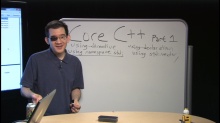Core C++, 3 of N: Overload Resolution -- Stephan T. Lavavej
 Core C++, 3 of N: Overload Resolution -- Stephan T. Lavavej
Core C++, 3 of N: Overload Resolution -- Stephan T. Lavavej
Stephan T. Lavavej, aka STL, will take us on a journey of discovery within the exciting world of Core C++. We know lots of folks are either coming back to C++, coming to C++, or have never left C++. This lecture series, in n parts, is for all of you! Only STL can make that work (novice, intermediate, and advanced all bundled together and presented in a way only STL can do).
In Part 3, STL digs into Overload Resolution. A function template can overload non-template functions of the same name. In this scenario, function calls are resolved by first using template argument deduction to instantiate the function template with a unique specialization (STL taught us all about TAD in Part 2). If template argument deduction fails, the other function overloads are considered to resolve the call. These other overloads, also known as the candidate set, include nontemplate functions and other instantiated function templates. If template argument deduction succeeds, then the generated function is compared with the other functions to determine the best match, following the rules for overload resolution. [source]
As STL says: "I walk through why foo(const T&) beats foo(const T *), when given int *. The reason is surprisingly subtle."
Tune in.

